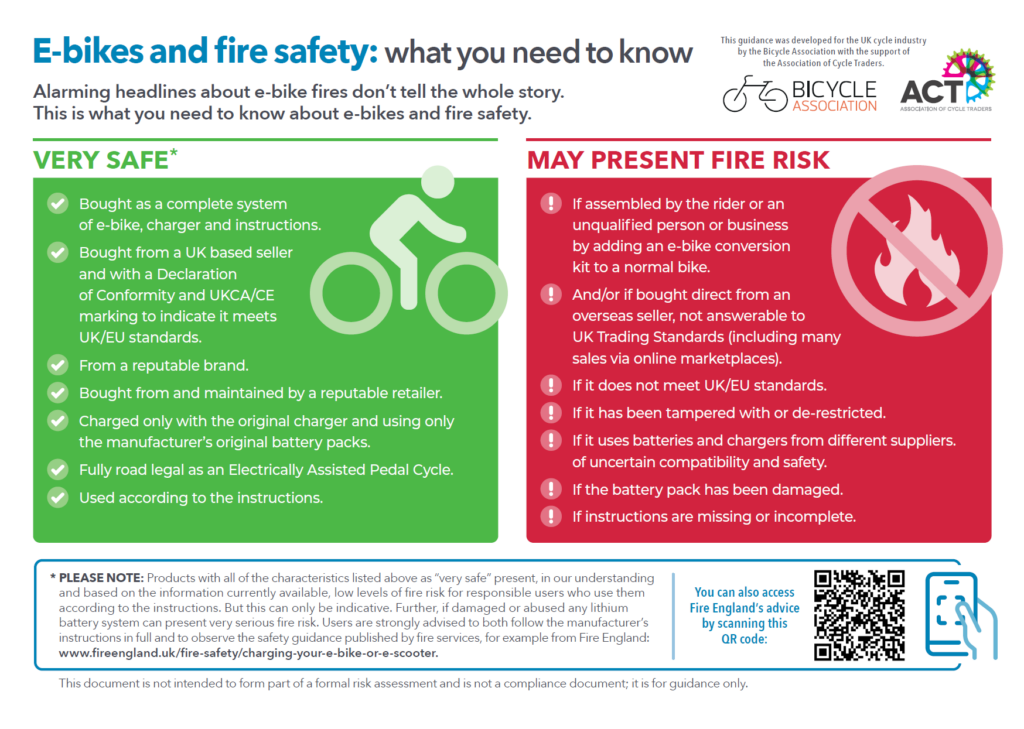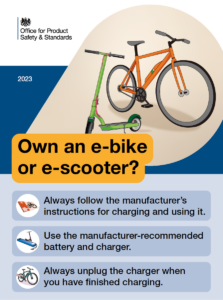E-bike battery initiatives & resources
E-bike battery guidance
Please click below to access the publicly available BA Guide to E-bike Batteries, summarising best practice and legal requirements in:
- Battery handling and storage
- Transportation and dangerous goods regulations
- Responsible sourcing for importers and suppliers
- Waste battery reporting and take-back obligations for suppliers.
BA member companies are supported with more in-depth advice from the Technical Service.
E-bike battery fire safety
BA statements and resources:
Government advice and resources:
Battery collection and recycling programme
Bicycle Association launches UK-wide battery collection programme
What’s the problem?
Electric bike sales are growing in the UK, and have doubled in the last 3 years to an estimated 200k in 2022. The BA believes that this figure is set to grow significantly in the coming years – even without the expected incremental sales to new and returning customers, the share of 1 million adult bike sales that are electric could rise to 50%.
Eventually, the batteries on these bikes expire, and need to be replaced (a typical battery will last 7-10 years under normal usage and charge cycles). Batteries on electric bikes are classed as industrial (as opposed to consumer batteries) and this classification means that companies classed as ‘Producers’ are responsible for their safe collection and disposal. In the near future, the industry is going to have to deal with many hundreds of thousands of batteries.
For Producers, in the UK cycle industry this mainly means brands and distributors, this is going to be expensive, and time consuming. Without an industry solution each Producer will have to engage with a third party to collect and recycle it’s own batteries. Resource will need to be found within organisations to manage this, and the cost of doing so will grow over time.
For retailers, if each Producer has its own solution, complexity at retail level will be high, and unmanageable. At present, many retailers are incurring battery collection and recycling costs that should be attributed elsewhere.
For consumers, it is important to know that a solution exists if their battery expires or is faulty. These powerful batteries need to be removed from homes, to be stored safely at retail level and ensure that the important materials within them can be recycled in the correct waste stream. At a time when the risks of e-bike battery fires are mainstream news, the provision of a certified, industry-wide, used and faulty battery collection service is important for the resilience of the sector and a point of difference for a trustworthy retailer.
What’s the solution?
In other markets, where electric bike sales have been higher and for a longer period of time, a national battery collection programme exists. Here, the trade body plays a co-ordinating role, sitting between a national network of retailers and a third party who runs a collection and recycling service. The BA is proposing to replicate this, and following a tender process has engaged the services of ERP to support the UK cycle industry.
How will it work?
The BA will ask retailers to step forward and nominate themselves to become part of a national network of collection points. As a part of this, ERP will supply retailers with UN-rated fireproof drums, in which expired or faulty batteries can be stored. When the drum is full, retailers will contact ERP, who will arrange to collect the drum and swap it out for an empty one. ERP will also be providing retailers with safe handling and storage guidance.
Producers are legally obliged to fund the recovery of expired and faulty batteries. Producer involvement has been shown to be critical in other markets to the success of such a programme. The BA is confident it can replicate this success, given that 90% of all bike batteries placed into the Specialist bicycle retail sector comes from just 16 brands (all of whom are BA Members).
Whilst retailers will incur the cost of dealing with customers, storing the batteries and dealing with ERP, there will be no actual charge for being a part of the collection network.
What’s next?
The BA and ERP ran a successful collection trial across retailers in late 2023 and early 2024. The initiative is now working to finalise contractual arrangements with producers, with the aim of starting full scale collections from retailers before the end of 2024.
The BA will ask retailers who wish to join the network to get in touch with us later this year. If you wish to do this at an earlier stage, please email [email protected]



